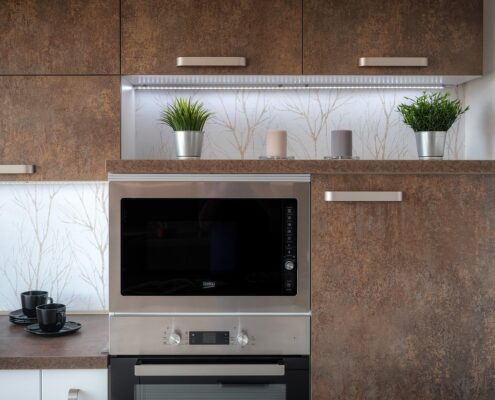What Wattage Should Your Microwave Be? And Other Burning Questions…
 Microwave ovens have become an essential appliance for most households. They offer quick and efficient cooking, which is perfect for those with busy lives. However, with the many different types of microwaves available on the market, it can be challenging to choose the right one. At Diamond Microwave Repair of St. Louis & Kansas City, we know our way around a microwave. In this blog, we will discuss the importance of wattage in a microwave oven, along with other common questions and considerations when choosing the perfect microwave for your home.
Microwave ovens have become an essential appliance for most households. They offer quick and efficient cooking, which is perfect for those with busy lives. However, with the many different types of microwaves available on the market, it can be challenging to choose the right one. At Diamond Microwave Repair of St. Louis & Kansas City, we know our way around a microwave. In this blog, we will discuss the importance of wattage in a microwave oven, along with other common questions and considerations when choosing the perfect microwave for your home.
What Wattage Should Your Microwave Be?
Wattage is a crucial factor when selecting a microwave because it directly affects the oven’s cooking efficiency and speed. Generally, microwave wattages range from 700 watts to 1200 watts. Here’s a brief guide to help you decide:
- 700-900 watts: These microwaves are best suited for small apartments or dorms, where space is limited. They are more affordable but take longer to heat food and may not cook as evenly as higher-wattage models.
- 1000-1100 watts: This range is suitable for most households, offering a balance between cooking efficiency and affordability. Microwaves with 1000-1100 watts can heat food quickly and evenly, making them a popular choice for many families.
- 1200 watts and above: High-wattage microwaves are ideal for large households or those who frequently use their microwave for cooking. They heat food faster and can handle larger dishes. However, they can be more expensive and consume more energy.
Remember that a higher wattage doesn’t always mean better performance. It’s essential to consider your needs and preferences before making a decision.
What Size Microwave Should I Choose?
Microwave size is another important consideration. You’ll need to think about both the external dimensions and the internal cooking capacity. Measure the space where you plan to place your microwave, ensuring it fits comfortably without obstructing any cabinets or other appliances.
Microwave ovens come in three primary sizes:
- Compact: These microwaves typically have a capacity of 0.5 to 1.0 cubic feet and are ideal for small kitchens or dorm rooms.
- Midsize: With a capacity of 1.1 to 1.6 cubic feet, midsize microwaves can accommodate larger dishes and are suitable for most households.
- Full-size: Full-size microwaves have a capacity of 1.7 to 2.0 cubic feet and are perfect for large families or those who frequently entertain guests.
What Features Should I Look For In A Microwave?
Modern microwaves come with a variety of features that can make cooking more convenient and efficient. Some popular options include:
- Inverter technology: Inverter microwaves provide more consistent heating by continuously adjusting the power level. This results in more evenly cooked food and the ability to defrost items without partially cooking them.
- Pre-programmed settings: Many microwaves have pre-set cooking programs for commonly cooked items like popcorn, baked potatoes, and frozen meals. These settings save time and help ensure your food is cooked correctly.
- Sensor cooking: Sensor cooking uses humidity sensors to determine when your food is cooked to perfection. It then automatically adjusts the cooking time and power level, preventing overcooking or undercooking.
- Convection cooking: Convection microwaves combine microwave and convection oven technology, allowing you to bake, roast, and even grill in addition to standard microwave functions.
- Child safety lock: A child safety lock prevents the microwave from being accidentally turned on by curious little hands.
How Do I Maintain My Microwave?
Proper maintenance is essential to keep your microwave working efficiently and prolong its lifespan. Here are some maintenance tips:
- Clean regularly: Wipe down the interior of your microwave with a damp cloth after each use to prevent food particles and spills from accumulating. Use a mild detergent or microwave-safe cleaning product for stubborn stains.
- Check the door seal: Ensure the microwave door seal is clean and free from damage. A damaged or dirty seal can cause heat loss and reduce cooking efficiency.
- Replace the light bulb: Replace the microwave’s interior light bulb when it burns out, so you can easily monitor your food while it cooks.
- Schedule professional maintenance: If you notice any unusual sounds, smells, or performance issues, contact a professional appliance repair service like Diamond Appliance Repair to diagnose and address the problem.
When to Use a Professional
Eventually, homeowners are likely to encounter technical issues with their appliances that a simple internet search cannot fix. Contact Diamond Appliance of Kansas City and St. Louis for expert consultation on any of your appliance repair needs.
By Jeff Russel, Owner of Diamond Factory Appliance
Jeff Russel is serving the greater St. Louis and Kansas City areas. Diamond Appliance provides efficient and effective service for all your appliance repair needs. Our knowledgeable technicians are trained to diagnose and fix any type of problem affecting major appliances quickly, reliably, and cost-effectively. We work hard to ensure customer satisfaction and their many positive reviews demonstrate the quality of our services.




